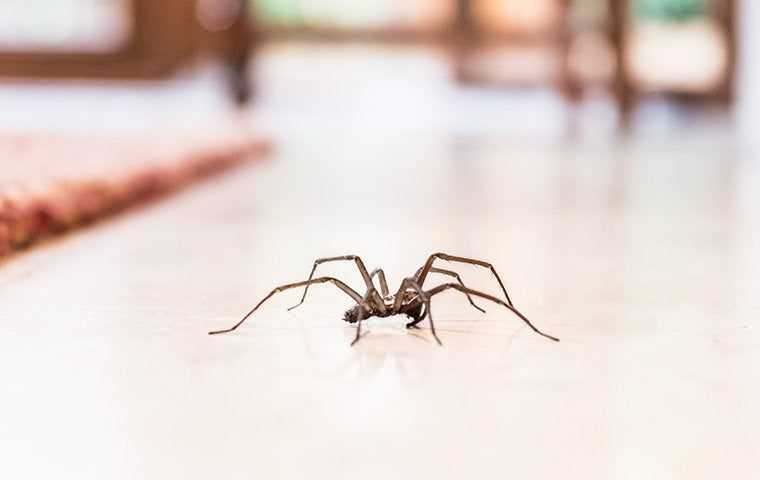
House Spider 101 Things To Know About Spider Control In Chesapeake
 Read Google Reviews
Read Google Reviews
We have a lot of spiders in Chesapeake. When spiders enter your home, you may not know whether or not you should worry. The best way to remove your worry is to contact a Chesapeake pest control professional. We can help you with that if you navigate to our contact page. But if you want to learn more about common spiders in our region, we have some great information to share today. Read on.
Identifying What Spider Is In Your House
If you're wondering what type of spider you're seeing, you need to consider the spider's age. Baby spiders don't look like adults. A black widow, for example, starts out with a mixture of colors and does not have a red hourglass. Since young spiders are the ones you are most likely to see in your home, you need extensive knowledge to identify spider species correctly. The best we can do is tell you general descriptions of adult spiders. If you can't identify the species or have a young spider that doesn't look like an adult, take a picture and send it to us. Our on-staff experts can take a look. Other than that, use these descriptions to help you with spider identification.
The Ten Most Common House Spiders
There are many ways we could compile a list of common house spiders in Chesapeake; we are going to combine two criteria. These are the most frequently seen and the spiders were most commonly called in to deal with inside Chesapeake homes and businesses.
- Wolf Spiders: These are hunter spiders. They are hairy spiders that have a similar appearance to grass spiders. The primary difference is that grass spiders use their webs to catch prey. It isn't easy to differentiate the two, but one way to distinguish them is that while wolf spiders create webbing, it isn't used for capturing their prey. They retreat into their webbing to protect themselves. You'll likely find this material lining the entrances to holes or hollow voids. They have good eyesight, and they use their eyes to track prey. Our best tip for identification is that wolf spiders hunt for prey and often get into Chesapeake homes. Grass spiders tend to stay outside and rarely enter homes.
- American House Spiders: Also known as common house spiders, these are widespread spiders found in Chesapeake homes. These tiny spiders are between 3/16 and 5/16 of an inch in length. They have bulbous abdomens and a dirty pale white coloration. A house spider creates light, wispy webs in aerial locations. You'll see these webs hanging from kitchen and ceiling walls. But you'll hardly ever see these spiders because they typically tend to more than one web at a time or quickly abandon webs that aren't catching anything. As these webs collect dust, you'll start to notice them.
- Daddy Longlegs Spiders: Though these spiders certainly have long legs, they are more appropriately called long-bodied cellar spiders. It is easy to tell them from other spiders. But more challenging to tell them from proper daddy longlegs. The proper daddy longlegs is an arachnid, but not a spider. The difference is seen in the shape of the body. A harvestman (non-spider) has a pill-shaped body with no definable head. The long-bodied cellar spider has two definable body parts: a cephalothorax and an abdomen. Together, they look like an exclamation mark, with the dot being the cephalothorax. You'll find long-bodied cellar spiders in humid spaces and likely in association with hard, cold surfaces or in low-lying and dusty locations in your garage. They make irregular webs that are loosely constructed, and they are often found in their webs. Though they do tend to stroll, you may find one clinging to a wall in an unexpected place.
- Orb Weavers: These outdoor spiders create webs that look like they belong in a Halloween display. They prefer to live in your landscaping and garden and aren't likely to get into your home. Some people leave these spiders alone so they can manage plant-damaging insects. There are a variety of orb weavers. It is best to use their webs to tell whether or not you have these spiders on your property. Look for those Halloween webs. If you see a big, visibly hairless spider, it is likely an orb weaver.
- Garden Spiders: You can expect to find garden spiders in your garden, just like the orb weaver. In fact, some garden spiders are orb weavers. We separate the two because there are garden spiders that don't create orb webs. If you see a large yellow and black spider or a web that looks like a zipper, you have a garden spider.
- Tarantulas: You can tell these spiders by their size and by the fact that they are hairy. But wolf spiders are also hairy. Look at the legs to tell the difference. The legs of a tarantula appear rounded. These spiders love moist environments and creep around in areas that are damp or high in humidity. We frequently find them in pool filters and ground burrows as well.
- False Tarantulas: The name says it all. They look like tarantulas. Consider the size of the spider you are attempting to identify. Smaller than tarantulas, they are similar in appearance. These spiders also like to live in ground burrows.
- Jumping Spiders: The name says it all. These spiders spring through the air to pounce on prey. Fortunately, they're small spiders and not as intimidating as tarantulas. These are small, hairy spiders. You can also distinguish them by their jump. They come in a variety of colors.
- Black Widow Spiders: These spiders need no introduction. You know that black widow spiders are considered dangerous spiders in Chesapeake. The venom of a black widow can cause medical symptoms that resemble the flu, and the symptoms are sometimes severe.An adult female black widow is jet black, shiny, and has a red hourglass on her abdomen. Males are smaller and look much different.
- Yellow Sac Spiders: The yellow sac spider is the easiest to identify. It has a pale yellowish color or may appear tan. These spiders cause bites that are often misdiagnosed as brown recluse spider bites. The venom of a yellow sac spider is necrotic, but most bites only result in an ulcer at the center, and they start to improve after a day or two.
Identifying spiders in Chesapeake is challenging because there are so many species, and young spiders don't look like adult spiders. Reach out to us if you need assistance.
Do All Spiders Bite Humans?
All spiders have fangs, and all spiders have venom, but not all spiders bite people. For example, the long-bodied cellar spider has weak fangs that are not strong enough to break through human skin. They are basically harmless spiders. Many other spiders that bite will only cause minor red bumps that itch. The best news of all is that spiders are generally docile. Scary wolf spiders, which are considered hunter spiders, are often handled without any issues. While we don't recommend holding a wolf spider, there are those who do it and don't get bitten.
If you're concerned about spiders and spider bites, the spider to watch out for is the black widow spider, but when we're asked, "Are there spiders that can kill humans?" we quickly respond with, "No." Even the black widow spider is not deadly in the United States, where we have a robust medical infrastructure. The last reported death associated with a black widow spider was in 1983. But these spiders bite people all the time, and it is often an unpleasant experience when they do. Be careful if you have to deal with them.
The Key To Keeping Spiders Out Of Your Home
Spiders don't tunnel into your home, so the primary way to keep them out is to seal gaps or holes they may use to get inside. You may do this by filling these entry points with expanding foam or replacing protective materials such as weatherstripping and door sweeps. On top of sealing entry points, it helps to roll your sleeves up and apply general spider prevention around your home.
Consider the following:
- Remove webs: Doing so will deter spiders from creating webs and may remove egg sacs containing hundreds of spiderlings.
- Wipe down surfaces and clean the corners of your garage: Spiders prefer undisturbed and dirty surfaces for web creation.
- Clear Clutter : Remove stacked wood, piled stones, junk piles, and other desirable hiding places for spiders.
- Reduce insect activity: Spiders eat insects. Replace white exterior lighting with yellow lighting. Keep your trash receptacles covered. Stay on top of pet waste clean-up.
- Address moist conditions: One way to do this around your home is to clean gutters.
- Landscape:Trim landscaping and remove unnecessary plants to thin your landscape vegetation. Keep your landscape plants healthy to deter insect activity. Reducing insects will reduce spider activity.
These steps are hard work. If you want to reduce that work or have added protection on top of what you do, reach out to Hawk Mosquito & Pest Solutions. We offer residential pest control to control spiders and the insects that spiders eat. We can guide you toward a plan that will work best for you. Connect with us today torequest a free quote and to learn more about our residential and commercial pest control services in Chesapeake. We're here to help.

Latest Blogs
Stay informed about pests and pest-related issues in your area!
Customer Reviews
-
"Use this company!! They are awesome."
The staff are top shelf and very customer service oriented. The quality of their work is great and we have loved using their services. There are certainly a lot of choices when it comes to pest control, but you won’t be disappointed with Hawk.
- Jarrod S. -
"Communication is unbeatable."
Great service!!! I ALWAYS get a text prior to them coming. Gives me time to put dogs away. I am able to address any issues with them at that time.
- Jamie C. -
"Hawk is a great company with an amazing staff."
They are always professional, courteous, and friendly. Everyone from the receptionist to the technicians surpass all levels of professionalism and make you feel like your business matters.
- Heather W. -
"Great company with a customer first mindset."
Great pricing, timely service response, effective solutions with an effortless customer experience. I highly recommend Rob and his Hawk Mosquito & Pest Team for all of your pest control needs - preventative and reactive.
- Chris L. -
"Thorough, educated, and gave us great advice."
Robert arrived to our inspection even before we did! He was thorough, educated, and gave us great advice. I will happily hire Hawk again and recommend the company to all of my friends and family.
- Elizabeth L. -
"Great service, follow through is 100% on everything."
We’ve used them to encapsulate and routine pest control for our home. Tommy is the best.
- Michell S. -
"Hawk communication is great!"
I always receive confirmation text for when service is scheduled. We have not had any mosquito issues and have had a great time in our backyard on the lake. Thank you Hawk!!
- Beverly S. -
"Always does an amazing job!!!"
We are so happy we changed over to Hawk a couple of years ago! We don’t have to keep track of the schedule and call a different company for different pests. Thank you so much, Hawk for your loyalty and quality service!
- Rochelle R.


.2402210201550.jpg)
